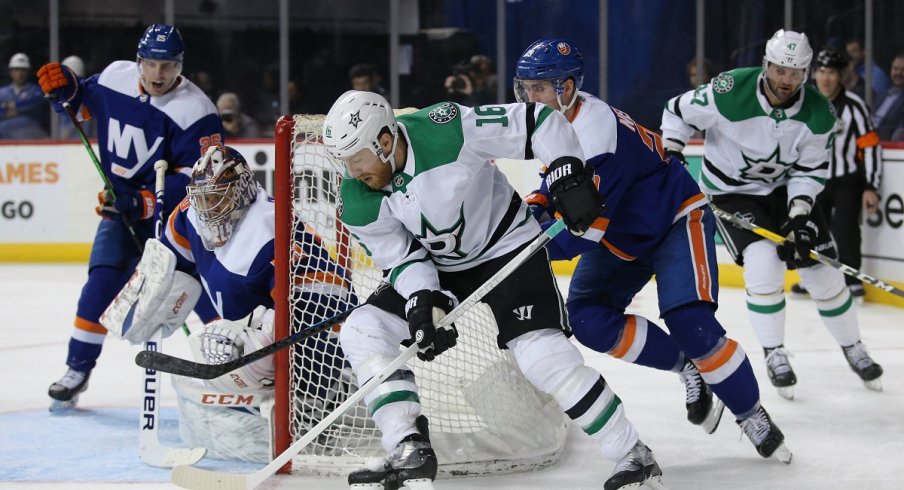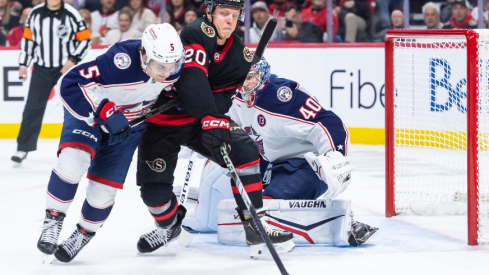In losing in five games to the Tampa Bay Lightning, it's hard to say that the Columbus Blue Jackets are legitimate Stanley Cup contenders.
But as we've seen for years, the NHL is filled with parity, and a stingy defense and a hot goaltender can often take a team that isn't known for its offensive star-power to a championship.
The St. Louis Blues won the Stanley Cup last season using this exact template. Riding rookie Jordan Binnington, a 25-year old goalie who came on the scene out of nowhere to finish 10th in Hart Trophy (NHL MVP) voting. They leaned heavily on a defense corp headlined by Alex Pietrangelo, but a veteran cast of Colton Parayko, Jay Bouwmeester, Joel Edmundson, and Robert Bortuzzo stymied teams. And while they have plenty of offensive weaponry in Ryan O'Reilly, Vladimir Tarasenko, Brayden Schenn, David Perron, Jaden Schwartz, and Tyler Bozak, they were far from the most gifted offense in the NHL.
The Blue Jackets aren't the St. Louis Blues. But they could be the Dallas Stars or the New York Islanders, two teams that are critiqued for being "boring" but are among the only eight teams still playing hockey. Though the two teams were constructed differently, they profile similarly. Both are defensive-minded teams that struggled to score consistently in the regular season but have found a way to advance (with ease?) thus far in the playoffs.
This past regular season, the Blue Jackets finished T-27th in the NHL with 2.57 goals/game. The Stars (26th, 2.58) and the Islanders (22nd, 2.78) have gifted offensive players (Mat Barzal, Tyler Seguin, etc.) but rely on a cast of capable players that aren't household names to get the job done. The average hockey fan probably wouldn't have known that Denis Gurianov (20) and Brock Nelson (26) led the Stars and Islanders, respectively, in goals this past season. That sounds like the Blue Jackets, who were led in goals by Oliver Bjorkstrand (21).
All three teams were also exceptional at keeping pucks out of their goal. During the regular season, the Stars (2nd, 2.52 goals against/game), Blue Jackets (T-3rd, 2.61), and the Islanders (T-7, 2.77) all finished in the top 10 in an obviously-important metric.
Barry Trotz and Rick Bowness (and Jim Montgomery before he was let go as Stars head coach) all prioritize defensive play to the detriment of offensive stats. Seguin, a five-time 30 goal scorer, had just 17 goals this year. Two seasons ago, Barzal had 85 points. In the two seasons since Trotz took over behind the bench, he's had 62 and 60 points (note: he only played 68 games this season).
The Stars and Islanders are far from unique; most NHL teams play defensively-oriented hockey. What is giving these two teams success in the postseason?
Every team says that want to have swift-skating, puck-moving, two-way defensemen. But each of these teams has that type of player in spades. The Stars have perhaps the best young defenseman in the NHL (which is saying something) in Miro Heiskanen. John Klingberg is as smooth as they come, and Esa Lindell is incredibly under-appreciated. They have snarl and size in Jamie Oleksiak and a steady veteran presence in Andrej Sekera. The Islanders don't have the same star-power (see what I did there?) on the blueline, but they make up for it their effectiveness due to Trotz's ability to lock down the neutral zone (sound familiar?) and score just enough to get by. Despite their lack of star power, they may be the most effective team in the NHL.
But even that can be misleading because both the Islanders and Stars are top-five in the NHL in goals/game in the playoffs. Both teams are scoring almost an entire extra goal per game. That's where the Blue Jackets will have to get in order to take the next step.
Many of these gains have come from internal growth. Aside from Gurianov, Heiskanen, and Klingberg, the Stars have gotten major contributions from offensive players like Roope Hintz. These are all young players who are graduating to a higher level in real-time. The Islanders are getting similar contributions from players like Anthony Beauvillier, Ryan Pulock, and Adam Pelech. These are all homegrown players. Graduating players from good to great should be the Blue Jackets' key priority over the next season.
The margin for error is razor-thin, and even a best-of-seven series can be a cruel way to determine a winner. And while both the Islanders and the Stars were eliminated in the second round a year ago (and could be again this year), they haven't won a Stanley Cup in this era.
On the other hand, their formula is clearly working, and both have proven that a stout defense corps, a defensive-oriented system, and opportunistic scoring can still compete - and beat - the best teams in the NHL.

